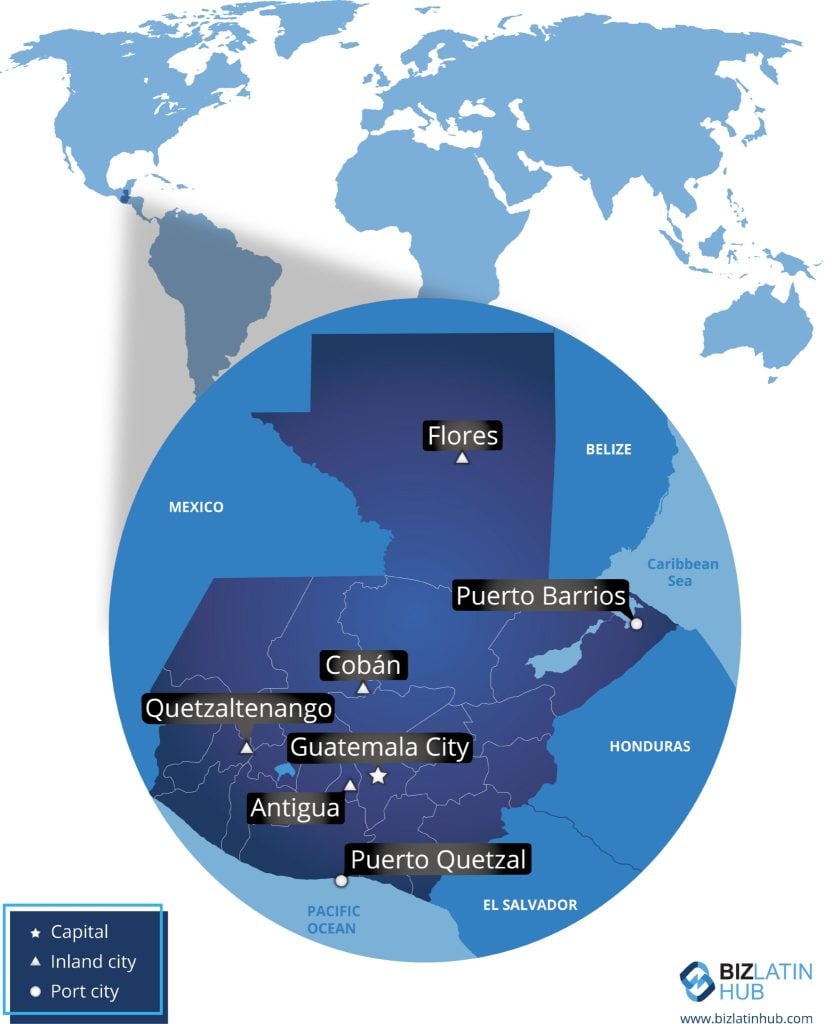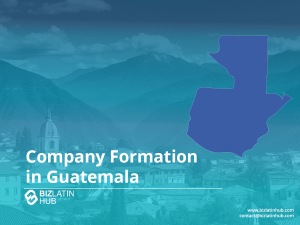When considering expansion into the Guatemala market, the first step is to determine the most appropriate entity for your business. For those looking to establish a presence without undergoing full company incorporation, registering a branch in Guatemala offers a practical solution. Registering a branch in Guatemala allows companies to enter the local market while maintaining ties with their parent company. Understanding the legal and administrative requirements involved in registering a branch in Guatemala is essential to ensure compliance with local regulations and facilitate smooth operations.
If you want to enter the market without incorporating a company in Guatemala, read on to understand the process and advantages of registering a branch in the country.

Guatemala has the largest economy in Central America and is the most prosperous among the ‘Northern Triangle’, which also includes El Salvador and Honduras. The country’s gross domestic product (GDP-PPP) has grown consistently since 1990.. Meanwhile, gross national income (GNI) — a key marker of general prosperity — has grown exponentially over the past 30 years to reach $10,600 per capita in 2022.
The Central American nation has also demonstrated its commitment to free trade, with free trade agreements (FTAs) reached with the United States, the European Union, and numerous Latin American markets, including Colombia, Costa Rica, the Dominican Republic, and Panama. Guatemala has seaports on the Caribbean Sea and the Pacific Ocean, with its international trade representing more than 30% of Central America’s total imports and exports.
Some of the country’s main export commodities include metals, oil, and timber, along with other valuable goods such as sugar, coffee, and bananas. Agriculture alone accounts for 13.5 percent of Guatemala’s GDP and generates employment for 31% of the country’s labor force.
Register a branch in Guatemala: 6 key steps
A branch in Guatemala will act as a direct extension of the parent company and will be able to perform activities related to sales and contracts. To register a branch in Guatemala, you must follow six key steps:
- Step 1 – Draft the company’s statutes.
- Step 2 – Certify the registration of the branch.
- Step 3 – Payment of the General Mercantile Registry fee.
- Step 4 – Post a $50,000 bond paid.
- Step 5 – Register the physical address.
- Step 6 – Appoint an agent who has power of attorney.
1. Draft the company’s statutes
Draft the company’s statutes and incorporation articles with the help of a trusted legal counsel and register the branch with a public notary.
2. Certify the registration of the branch
Certify the registration of the branch in Guatemala before the Ministry of Foreign Relations.
3. Payment of the General Mercantile Registry fee
The third step you need to follow would be to pay the General Mercantile Registry fee.
4. Post a $50,000 bond paid
In order to secure the operations of the branch, you need to post a $50,000 bond paid.
5. Register the physical address
In order to comply with the Guatemalan law, you need to register the physical address of the new branch in Guatemala.

6. Appoint an agent who has power of attorney
Last, you will need to appoint a power of attorney. He will be the ”legal face” of your business in Guatemala, and will act on behalf of the business.
Note that all documents submitted in support of the registration process must be professionally translated into Spanish.
What are the essential documents for setting up a branch?
Here are the essential documents required for setting up a branch in Guatemala:
- Public Deed of Constitution: This is the legal document that establishes the existence of the company. It includes details such as the company’s name, purpose, duration, capital, and the appointment of directors and officers.
- Certificate of Appointment of the Legal Representative(s): This certificate confirms the appointment of the individual(s) who will represent the company legally.
- Identification of Business Owner(s): This could be a passport or any other government-issued identification document.
- Tax Domicile of the Company: This is the registered address of the company for tax purposes.
- Receipts or Other Proof of Payment of Fees: These are the receipts that confirm payment of the necessary fees for setting up the branch.
7 Advantages of registering a branch in Guatemala
The main advantages of choosing to register a branch in Guatemala include:
- Productivity: Compared to the process of establishing a company, registering a branch in Guatemala is very simple. This will allow your business to be productive in a short space of time.
- Productivity: Compared to the process of establishing a company, registering a branch in Guatemala is very simple. This will allow your business to be productive in a short space of time.
- Limited liability: By registering a branch, a company establishes a legal presence in Guatemala. This means that it will not have the same legal responsibility as the headquarters or an independently incorporated organization.
- Low cost: It is generally less expensive to form a branch in Guatemala than to go through company formation.
- Low tax rate: Value-added tax (VAT) in Guatemala is one of the lowest in Latin America at 12% and is not imposed on the exportation of commodities such as coffee and sugar. Furthermore, all foreign corporations are taxed as if they were Guatemalan corporations.
- Pro foreign investment laws: There are relatively few restrictions on foreign investment and no limits on foreign participation in domestic enterprises. Also, foreign companies may own 100% of a domestic enterprise and are guaranteed national treatment by law.
- Free trade zones: If you register a branch in Guatemala, you will be able to access its 11 free trade zones. All have developed infrastructure and certain tax exemptions.
Tax regulations in Guatemala
Once you have registered your branch in Guatemala it is important to understand the local tax regulation that you will be liable for. Making sure all taxes are paid correctly is essential in maintaining the legality of your branch in Guatemala, therefore, an important part of setting up your branch is to be prepared for paying taxes.
Fortunately, foreign companies in Guatemala are taxed as if they were national companies, this means you will not have to pay any extra taxes for being a foreign investor. Also, you will be exempt from paying any withholding tax. The main consideration outside of the normal taxation laws is that, as a branch of a foreign business, you must keep your accounting records for your Guatemalan operations separate from other branches.
Register a branch in Guatemala with the help of Biz Latin Hub
If you are looking to register a branch in Guatemala, or need other professional advice related to company formation, engage with our multilingual team of legal and accounting specialists, who are equipped to support your commercial operations in the country. With our full suite of market entry and back-office services, we can be your single point of contact to successfully establish a branch in Guatemala.
Reach out now for further advice or a free quote.
Learn more about our team and expert authors.






